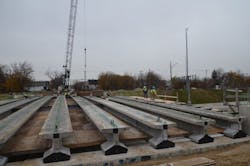Michigan DOT using carbon fiber to reinforce bridge components on major projects
The Michigan Department of Transportation (MDOT) says the agency is continuing to pioneer the use of carbon fiber to reinforce bridge components on major projects.
The department said in a news release that since 2001, MDOT has been collaborating with Lawrence Technological University (LTU) in Southfield on researching carbon fiber reinforced polymer materials in concrete bridge beams. That research has moved from the lab into the field, with projects now being deployed.
"The aim is bridges that last a century with minimal maintenance," State Transportation Director Paul C. Ajegba said in a statement. "This technology, developed here in Michigan, is becoming wildly popular all over the country."
MDOT says steel has been the go-to material for prestressing concrete for highway bridges, but it is prone to corrosion and deterioration under assault from extreme temperatures, water, and deicing chemicals—conditions all too common in Michigan. Carbon fiber strands have a tensile strength comparable to steel, but they resist corrosion and require less maintenance over time. Longer service life is the major benefit of carbon fiber, according to MDOT.
The southbound I-75 span over the Sexton-Kilfoil Drain in Detroit incorporates carbon fiber in the beams. At 140 ft, they are some of the longest concrete beams in the state. Two bridges are currently being built with carbon fiber reinforced beams as part of MDOT's I-94 modernization project, also in Detroit. Those bridges will use beams with newer 0.7-in. diameter carbon fiber strands, allowing greater initial tensioning than steel.
MDOT and LTU have conducted years of extensive research on carbon fiber components, looking to optimize the design process and encourage more widespread use. Now, bridge designers have the information and specifications they need to predict how carbon fiber reinforced beams will perform under a variety of real-world conditions, as well as design tools for future bridge projects.
MDOT says engineers are now closer than ever to their goal of building bridges with a minimum 100-year service life.
-------------
SOURCE: Michigan DOT
